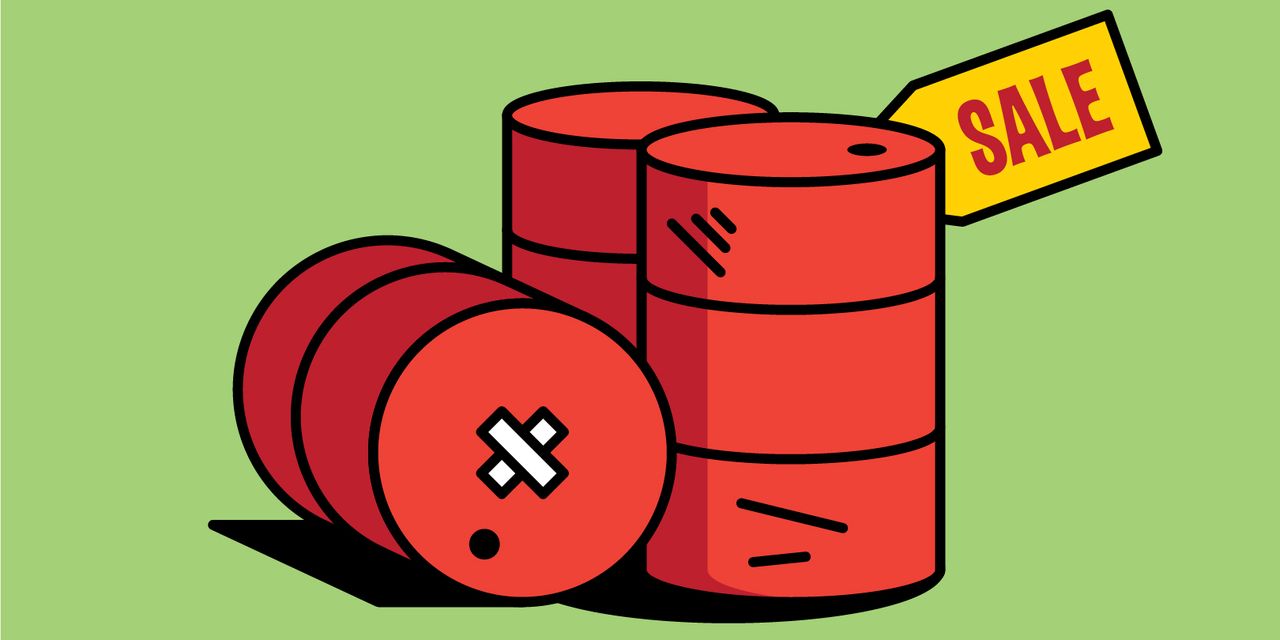After the Organization of the Petroleum Exporting Countries and its allies said in early April that members would cut more than one million barrels per day of oil production, the path of prices looked clear. Supply was falling, demand was on the rise, and there was only one way for oil to go—up. The pattern held for about two weeks, but it has since reversed—and sharply, too.
International oil prices fell 9% in just three days this past week, trading down to $72.33 per barrel, the lowest level since December 2021. The price of West Texas Intermediate, the U.S. benchmark, fell below $70 for the first time since March, erasing all of the gains it had made since OPEC’s announcement, and then some.
The problem is that global demand for oil hasn’t rebounded as strongly as the bulls had expected. China’s economy has improved, but with insufficient verve.
BP
Chief Financial Officer Murray Auchincloss said this past week that Chinese fossil-fuel demand is up on the retail side, but “we haven’t seen as much industrial demand.” In addition, “demand is a little bit soft in northern Europe.”
Marathon Petroleum,
a major refiner, said on Tuesday that gasoline and jet fuel have been strong, but there has been “sluggishness in demand” for diesel.
Morgan Stanley
reduced its third-quarter oil price expectation to $77.50 from $90.
What’s next? Some think that OPEC might have to step in again. If prices don’t improve, “we think OPEC would be prepared to take additional action to put in a price floor and scare off the [short sellers],” wrote RBC Capital Markets analyst Helima Croft.
Write to Avi Salzman at [email protected]
Last Week
Crisis Over? Not Yet
The week began with Morgan Stanley saying it would lay off 3,000 workers, 11,500 Hollywood writers going on strike, and news that the debt ceiling was closer than expected. And
JPMorgan Chase
bought
First Republic Bank
from regulators. After that, the banking crisis spread to regional banks PacWest, Western Alliance, and First Horizon, which saw shares hammered. Oil fell. Stocks slid again after the Federal Reserve rate hike, then rallied after a big jobs report. On the week, the
Dow industrials
fell 1.23%, to 33,678.53; the
S&P 500
slipped 0.79%, to 4136.37; and the
Nasdaq Composite
crept up 0.07%, to 12,235.41.
Warning: The Earnings Beat
A grab bag of companies offered a variety of mixed messages. Uber beat on revenue.
Starbucks
beat but offered lackluster guidance; so did
CVS Health,
which warned on acquisition costs, and
Advanced Micro Devices,
which warned on slowing PC sales.
Qualcomm
met expectations but was gloomy, and
Apple
revenue fell, although iPhone sales were strong. And in a sign of the times: Edtech
Chegg
warned of the threat of artificial intelligence to its business.
A Hike and a Sort of Pause
As expected, the Fed rate-setting committee raised rates by 0.25%—No. 10 in this cycle. Fed Chairman Jerome Powell said the Fed may pause and watch the data, and warned of dire consequences of a debt default.
Hitting the Ceiling
Treasury Secretary Janet Yellen said the government might not be able to pay its bills by June 1, effectively a deadline for the debt-ceiling debate. With Congress out of session. President Joe Biden set a May 9 date for a meeting with House and Senate leadership. The Veterans Administration warned that the GOP budget proposal would create significant problems for veterans. The White House followed with default scenarios and costs.
Ukraine: The Buildup
Yevgeny Prigozhin said he would withdraw Wagner fighters from Bakhmut due to lack of military support, as Russian forces took defensive positions in expectation of a Ukraine counteroffensive. The White House estimated Russia suffered 20,000 dead and 80,000 wounded since December. The Kremlin was hit by two drones and blamed Ukraine and the U.S.
Annals of Deal Making
The Federal Deposit Insurance Corp. seized First Republic Bank and accepted a bid from JPMorgan Chase, which had led private efforts to rescue the bank. PNC and
First Citizens
also bid. JPMorgan took on First Republic’s $93.5 billion in deposits and $173 billion in loan assets and paid the FDIC $10.6 billion. JPMorgan and the FDIC have a five-year loss-sharing pact on unrealized loan losses…Japan’s No. 2 drug company,
Astellas Pharma,
agreed to pay $5.9 billion for
Iveric Bio,
a U.S. biotech that specializes in eye treatments…The Wall Street Journal said Vice Media is nearing a deal to sell to its lenders out of bankruptcy. The price: a lot less than the $5.7 billion it was once valued at…Hindenburg Research put out a report arguing that
Icahn Enterprises
units are inflated. Carl Icahn denied it.
Read the full article here







